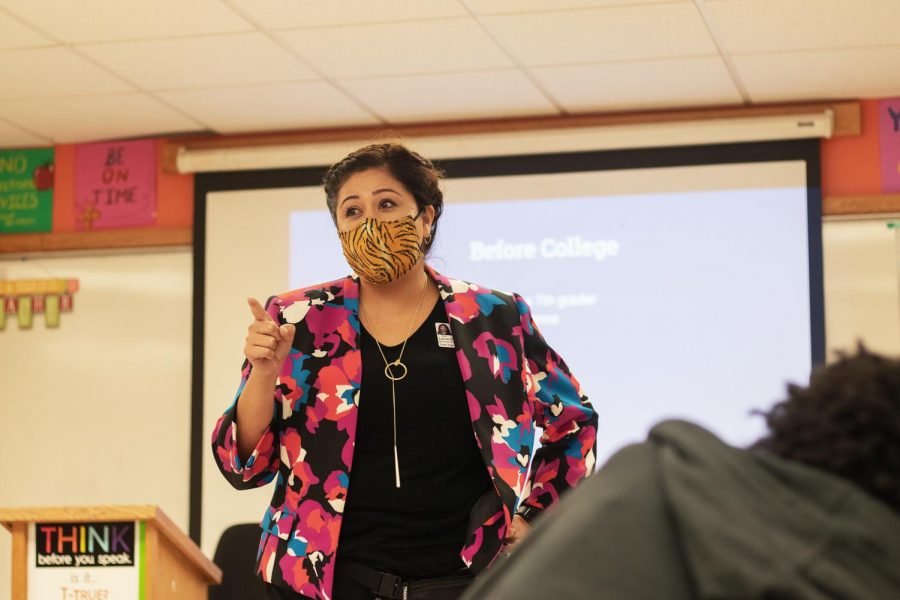Chickening out
Principal overcomes childhood circumstances
Photo by Carrigan Brush
Mrs. Ochoa lectures Reach students about life lessons on Oct. 8,2020. The talk enlightened students in the class and served as an eye opener to the real world.
November 1, 2020
Her eyes quivered with guilt as she endured another scolding from her mother in Spanish regarding grades. Despite the fact she understood only a small fraction of the English language, her mother expected nothing but excellence when they immigrated to America. A’s were good. B’s were OK.
The grade she was handed back the next day in class was neither of those letters.
Unsurprisingly, her teacher handed back a paper marked with a scolding “D” at the top. Once again, she was a disappointment to her mother, and as a result, a disappointment to herself. There was no hiding the tears that flowed like rapids down her cheeks.
Recognizing the situation, the teacher showed, not sympathy, not pity, but apathy. The teacher simply shrugged, waved her hand and reassured her, “Don’t worry. They don’t look at your grades at the chicken plant.”
“I stopped for a second, and I believed that,” assistant principal Lucia Ochoa said. “Every time I tried to look for the people that looked like me, they weren’t [at] any other place but at the chicken plant or at the other factory. So it made sense that, really, it didn’t matter how hard I try. It didn’t necessarily mean that I was going to go somewhere different.”
It seemed as if the expectations for Hispanics in her rural town were not very high. This is one of many challenges she faced as a Mexican immigrant in a world with few role models of her complexion.
“I just felt out of place,” Ochoa said. “I’m sure you have felt like that before. Then, you have others that don’t help that feeling. It was like I didn’t belong.”
Before her move, she did belong. Immigrating to America became the safest for her mom and sister, which only made social situations harder for a young Ochoa.
“For one, I was a teenager, so you’ve got all kinds of stuff going on as it is,” Ochoa said. “Then, I lost my language, my ability to communicate with others. I had to leave my family [and] grandparents who I was very close to. Then, I lost my culture, and I lost what I knew in the way that the school system worked out.”
Although that barely passing math grade was unacceptable in her mother’s eyes, it was a barely passing grade in a language she couldn’t even speak. Lacking the financial freedom for a computer, her tutor was a Spanish to English dictionary that assisted her in understanding assignments.
“That’s what [my mom] was able to afford,” Ochoa said. “She said, ‘Here ya go, You can translate your assignments.’ I had to translate instructions, do my assignments in Spanish [and] translate it back into English so I could turn it in. So much was lost in translation.”
Ochoa’s feelings of alienation were apparent in more than one classroom. Since most Hispanics around her worked in manual labor, she had little to no role models with similar aspirations as her.
“I don’t remember having an African American teacher,” Ochoa said. “I remember having one classmate that was African American. I don’t remember having a Latina teacher for sure. So nobody really looked like me. When I tried to see somebody that was kind of like me, or just spoke my language, I was not able to really find that.”
At the end of these teen years of academic difficulty came the question of what her adulthood would look like. Ochoa dreamed of the stereotypical American college experience, but with that came a hefty tuition fee that she was in no means of affording. This resulted in an associate’s degree at Cassatot Community College and a bachelor’s degree at Southern Arkansas University and a clear career path.
“I knew one thing. I knew I wanted to be a teacher,” Ochoa said. “I wanted someone that looked like me in the classroom. [The] plan was [to] be a teacher for five years then become an administrator and get to see and impact more kids.”
As the years went by in her career path, she found inspiration from teachers that helped change her perspective on who she was and what her life could be beyond what she thought was possible for someone like her.
“In 9th grade, [I found] other people that inspired me. I had amazing teachers that saw something in me and that, although I was not fully able to understand their language, they wanted to help me out,” Ochoa said. “I want you to remember people inspire you one way or the other.”
Ochoa took inspiration from the teacher that once shot her down and told her she was destined for the chicken plant. The only difference is that she doesn’t work on one. She owns a poultry farm.
“In 2017, my husband and I started a chicken farm, and our farm produces the eggs that go to the hatchery that are later raised to end up at the chicken plant to be processed. So I do have a hand in the chicken plant, just not the same way,” Ochoa said. “Last year, our small farm was the third farm in the area, the third breeder in the area which was pretty cool and at its peak it produced about [twenty] thousand eggs a day.”
Being a Hispanic lower class in her town was not an easy task, and she had to fight for her place in school, in her community and even in her workplace to defy expectations. She is now far from stuttering through language barriers and shedding tears over test grades. She now flips through a PowerPoint, explaining her advice to students like her in near-perfect English.
“If you really have your goal and you focus [setting] that goal, you too can be unstoppable. You should be on something,” Ochoa said. “You should not wait to have a seat in that class. Make your way and make that your seat.”

















